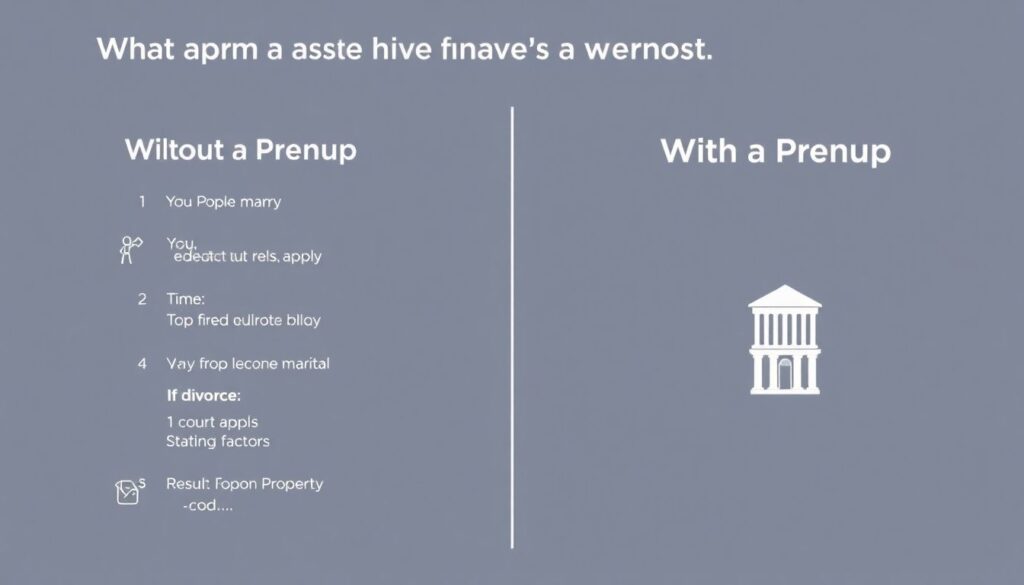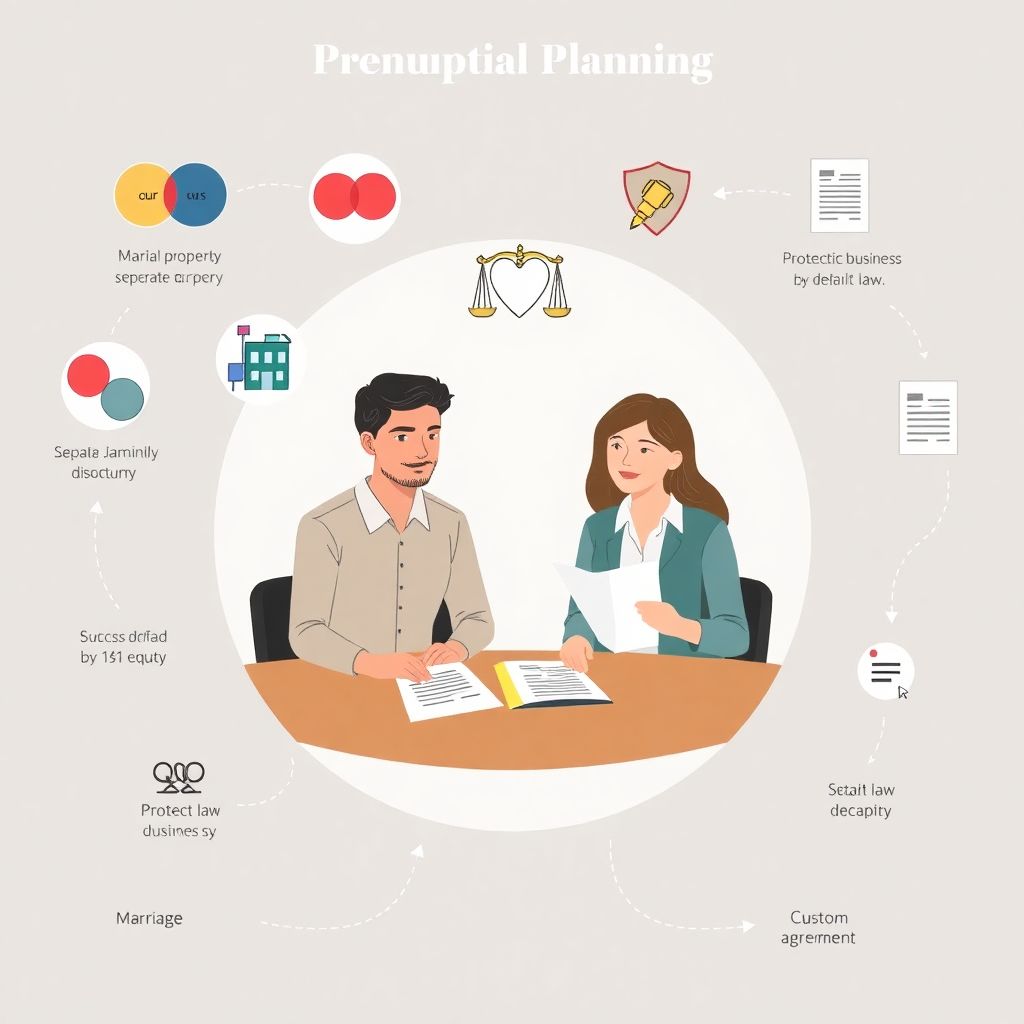What “Prenuptial Planning” Actually Means (Without the Legal Jargon Fog)

When people say “prenup,” they usually mean a prenuptial agreement: a written contract two people sign *before* getting married that sets out how money, property, business interests and sometimes debts will be handled during the marriage and if it ends.
In technical terms, a prenuptial agreement is a premarital contract that modifies the default rules of marital property, spousal support and inheritance that your state or country would otherwise apply.
More clearly:
– Marital property – what is treated as “ours” by default once you marry (salary, some investments, possibly the house you buy together).
– Separate property – what is treated as “mine” or “yours” only (pre‑marriage assets, inheritances, certain gifts).
– Prenuptial planning – the process of mapping out:
– what will be marital vs. separate property,
– who is responsible for which debts,
– how to treat businesses, stock options, real estate,
– and whether there will be limits on spousal support.
Put simply, prenuptial planning is like customizing the “legal operating system” of your future marriage instead of using the default settings.
—
Why People Are Suddenly Talking About Prenups More
Over the last few years, prenuptial agreements have quietly moved from “only for the ultra‑rich” into the mainstream.
Based on surveys from U.S. bar associations and family‑law research published between 2022 and 2024:
– Family lawyers report that requests for prenups have grown by roughly 25–35% compared with 2019.
– Among engaged couples under 35, about 40–45% say they would consider a prenup, versus roughly 20–25% a decade ago.
– In households where at least one partner owns a business or significant stock options, up to 55–60% of couples at least discuss a prenup with counsel.
Drivers are pretty consistent across the data:
– Rising average student loan debt (commonly $30,000+ per borrower).
– More dual‑income households and “complex” assets (equity compensation, crypto, international property).
– Many couples being children of divorce and wanting more predictability.
So the question “Prenuptial Planning: Is It Practical for You?” isn’t fringe anymore; it’s something a very wide slice of modern couples are weighing.
—
Key Terms You Should Know Before You Decide
To understand if this is practical for you, you need a few core definitions.
1. Community property vs. equitable distribution
– In community property jurisdictions, most property and income acquired during marriage is treated as owned 50/50, regardless of whose name is on the account.
– In equitable distribution jurisdictions, the court divides marital property in a “fair” (not always equal) way based on multiple factors.
2. Full financial disclosure
For a prenup to stand a chance in court, both partners must provide accurate, comprehensive lists of assets, incomes and major debts. Hidden accounts are a fast track to invalidation.
3. Consideration and voluntariness
– Consideration: Each partner is giving up or adjusting some legal default in exchange for certainty or protections.
– Voluntariness: Both must sign without coercion, pressure, or “sign this tonight or no wedding tomorrow” situations.
4. Unconscionability
If terms are so one‑sided and harsh that they “shock the conscience,” a court can refuse to enforce them, especially if circumstances changed drastically over time.
Knowing these technical terms helps you move from fear or myths to actual risk‑benefit analysis.
—
Text-Only Diagrams: How a Prenup Changes the Default Rules

Imagine a simplified “flow” of what happens to assets without vs. with a prenup.
Without a prenup:
1. You marry →
2. State default rules apply →
3. Over time, property acquired during marriage becomes marital →
4. If divorce: court applies statutory factors →
5. Result: property division and possible support are decided by a judge.
With a prenup:
1. You marry →
2. You both sign a valid premarital contract →
3. The contract defines marital vs. separate property, debt allocation, and possible support →
4. If divorce: judge starts from what’s in the contract, adjusting only if parts are invalid or unconscionable →
5. Result: more predictable division according to agreed rules.
In simple ASCII‑style form:
Default path (no prenup):
`Marriage → State law defaults → Judge’s discretion → Outcome`
Prenuptial planning path:
`Marriage → Custom contract (prenup) → Contract + limited discretion → More predictable outcome`
This is the “architecture” you’re deciding to use or not use.
—
When Prenuptial Planning Is Usually Practical
In practice, lawyers see certain repeat‑pattern situations where a prenup is almost always worth serious consideration.
Common triggers:
– One or both partners own an existing business or professional practice.
– There is or will likely be family money (trusts, inheritances, future gifts).
– One partner is entering the marriage with significantly more assets than the other.
– Either or both carry substantial debt (student loans, business loans, medical bills).
– One partner plans to pause their career to support the other’s career or to handle childcare.
In these cases, the prenup isn’t about betting on divorce; it’s about:
– Preventing your partner from unintentionally becoming responsible for your old debts.
– Shielding family business partners or investors from marital disputes.
– Setting fair expectations if one of you steps back from paid work for the family.
If none of these apply—both partners have comparable assets, low debt, simple finances—the “ROI” of a formal prenup is less obvious but can still be about clarity and peace of mind.
—
Short Reality Check: What a Prenup Cannot Do
A prenup is powerful, but not a magic wand.
Most jurisdictions will not fully enforce clauses that:
– Predetermine child custody or parenting time.
– Completely waive child support or severely limit it.
– Encourage divorce as a “reward” scenario.
– Contain criminal or blatantly discriminatory terms.
Courts retain authority to protect children and prevent extreme unfairness, regardless of what the documents say.
—
Comparing Prenups to Other Planning Tools
People often confuse prenuptial agreements with other legal instruments. They’re related but not interchangeable.
– A will covers what happens when you die; a prenup mostly covers what happens if you divorce (and to a lesser degree, death).
– A cohabitation agreement is similar in structure to a prenup but applies to unmarried partners in long‑term relationships.
– A postnuptial agreement is like a prenup signed *after* marriage, often used when big financial changes occur later.
Conceptual comparison in words:
– Prenuptial agreement – sets rules *before* marriage, low emotional and legal conflict if done early.
– Postnuptial agreement – sets or updates rules *after* marriage; sometimes scrutinized more closely by courts.
– No agreement – full reliance on your jurisdiction’s family code and judge interpretation.
If you’re trying to decide whether prenuptial planning is practical, ask yourself if you’re comfortable leaving all decisions to default law, or if you want a customized set of rules similar to how businesses use contracts.
—
What It Typically Costs (And Why the Range Is So Wide)
One of the main concerns people voice is the cost of prenuptial agreement drafting. Numbers from family‑law surveys and law‑firm reports between 2022–2024 show a wide range:
– Straightforward situations, one jurisdiction, modest assets: often $900–$2,500.
– Moderate complexity (business interests, stock options, separate‑property tracing): often $2,500–$6,000.
– High complexity (multiple businesses, international assets, trusts): can reach $10,000+ in large markets.
The variation reflects not just hourly rates but:
– How many negotiation rounds you need.
– Whether valuation experts or tax advisors must be involved.
– Whether there are cross‑border elements.
If that sounds high, it’s worth contrasting it with the potential legal fees in a contested divorce involving a business, which can easily run into tens of thousands of dollars. That’s the core economic argument for many couples.
—
“Online” Versus Traditional: Not All Services Are Equal
In the last three years, online prenuptial agreement services have gained traction, especially with tech‑savvy couples. They typically offer:
– Guided questionnaires.
– Auto‑filled contract templates tuned to your jurisdiction.
– Optional attorney review for an added fee.
They can be cost‑effective for fairly simple cases, but they have limits. They may not be ideal when:
– You or your partner own a business, rental properties or complex investments.
– Either of you has immigration issues that intersect with marriage.
– You are in different countries or states with conflicting laws.
In more complex or high‑stakes cases, people often look for the best prenuptial agreement attorneys they can find in their region—experienced family lawyers who do prenups regularly, understand enforcement trends, and can anticipate which clauses are likely to be controversial in your local courts.
—
How to Decide If It’s Practical for *Your* Relationship
Let’s boil things down to a decision framework. Consider three dimensions: financial complexity, risk tolerance and relationship dynamics.
Ask yourself:
– Financial complexity:
– Do either of you own a business or expect to start one?
– Do you own property in different states or countries?
– Are there major debts or potential inheritances in play?
– Risk tolerance:
– Are you comfortable relying on your state’s default rules without ever having read them?
– How would you feel if a judge made major financial decisions about your life?
– Does one of you have more to lose under those default rules?
– Relationship dynamics:
– Can you talk about money without shutting down or escalating into conflict?
– Are you both open to transparent disclosure of income, assets and debts?
– Does the idea of a prenup feel like planning for divorce, or like insurance for worst‑case scenarios?
If your financial complexity is high and your risk tolerance is low, prenuptial planning is usually practical, even if emotionally awkward at first.
—
Step-by-Step: How to Get a Prenuptial Agreement Before Marriage

Timing is crucial. Most courts frown on last‑minute agreements.
A typical high‑level process looks like this:
1. Start early
Aim for at least 3–6 months before the wedding. This reduces claims of pressure or rushed signing.
2. Pre‑talk without lawyers
Discuss your financial values, fears and goals as a couple. This is not a negotiation yet, just alignment.
3. Engage separate legal counsel
Each of you should have your own attorney. Yes, that’s extra cost, but it greatly increases enforceability and fairness. This is where a search like “prenuptial agreement lawyer near me” makes sense, because jurisdiction really matters.
4. Disclosure and draft
You both prepare complete financial statements; your lawyers draft based on those, along with your mutually agreed priorities.
5. Negotiate terms
This might involve a few rounds of edits. Expect give‑and‑take; a one‑sided document is both risky legally and corrosive emotionally.
6. Finalize and sign properly
You sign with all formalities required in your jurisdiction—often in front of witnesses or a notary, sometimes both. Keep original copies safe and make sure your attorneys retain copies.
Structured this way, the process becomes finite and manageable rather than an open‑ended emotional battle.
—
Concrete Examples: Who Actually Benefits?
To make the analysis more tangible, consider three common scenarios.
– Tech employee + freelancer
One partner has stock options and RSUs with a tech company; the other has variable freelance income. A prenup can:
– Clarify how to treat future options and equity.
– Allocate responsibility for existing tax liabilities.
– Decide what happens if one partner pauses work for childcare.
– Second marriage with kids from prior relationships
Both partners own assets and want to protect children’s inheritances. Prenuptial planning, combined with estate planning, can:
– Ring‑fence certain assets for existing children.
– Prevent conflict between a surviving spouse and stepchildren.
– Define spousal support expectations if the marriage ends.
– Entrepreneur + medical professional
One partner runs a startup; the other has substantial student loan debt and a secure salary trajectory. A prenup can:
– Ensure business partners aren’t dragged into marital litigation.
– Keep pre‑existing loans separate.
– Provide a fair safety net if one partner relocates or changes jobs for the other.
In all three, the practical benefit is clarity, not pessimism.
—
Working With Lawyers: What to Expect
If you opt for traditional counsel, the first consultation is often exploratory. You describe:
– Relationship history and intended wedding date.
– Major assets and debts.
– Career expectations and whether someone may step back for caregiving.
Good counsel will then:
– Outline likely enforcement standards in your jurisdiction.
– Identify “red flag” clauses courts dislike.
– Propose a structure balancing asset protection with fairness.
This is where high‑quality, specialized practitioners matter. The attorneys who regularly handle complex premarital contracts tend to understand how judges have treated similar agreements over the past few years, and they draft accordingly.
—
Is Prenuptial Planning Practical for You? A Short Synthesis
If you strip away the stigma, the decision comes down to three core points:
– Predictability vs. uncertainty
You can accept your jurisdiction’s one‑size‑fits‑all system or define key rules yourselves.
– Complex vs. simple finances
The more complex the finances and future expectations, the more useful a prenuptial agreement becomes.
– Communication vs. avoidance
Drafting a prenup forces transparent, sometimes uncomfortable, but ultimately clarifying conversations about money, roles and long‑term plans.
The last few years of data show more couples choosing to have those conversations early rather than leaving everything to chance. Whether you join them depends less on your level of romance and more on your appetite for planning.
If you and your partner can approach this as joint risk management rather than a prediction of failure, prenuptial planning is not only practical—it can be one of the more mature joint decisions you make before walking down the aisle.
